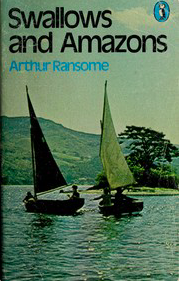One of the most exciting Christmas presents I ever received was when I was about eleven and I got a full set of the Swallows and Amazons books by Arthur Ransome (except for Missee Lee, which I did manage to collect eventually and then kind of wished I hadn't). Already favourites, I then proceeded to read them all again multiple times, to the point where my copy of Swallows and Amazons (not even a particular fave) is almost falling apart. Discovered on an English holiday when I was eight, Ransome's books were a firm foundation of my childhood.
Though Swallows and Amazons is getting on for a hundred years old now, I still enjoyed most of this book. The sturdy, self-reliant children, dealing with the practical details of sailing and camping are wonderful role models, and they're not too perfect -- things do go wrong, and they make some dumb decisions (like sailing at night, a very tense chapter). And I especially love the way they effortlessly slip between reality and their imaginative world of pirates and explorers.
But -- and it's a big but -- this time around I noticed how the children's constant references to 'natives' (ie adults) and 'savages' really grated on my nerves. I'm ashamed to say that this made no impression on me whatsoever as a child or teenage reader, and was only really brought to my attention by the estimable Michelle Cooper. Without having recently re-read the books at the time of her blog post, I suggested that someone might rewrite the novel to remove those references, because I only clearly remembered one scene where Titty (oh dear) and her mother talk about 'savages', but now I realise how thoroughly the 'native' conceit is woven through the texture of the whole book, and as Michelle correctly noted, it would be impossible to remove. It's such a shame, because the positive aspects of the book are so strong, and yet its whole fabric is stained by this dated element. I think, I hope, that the 'native' side of things tones down somewhat in later volumes? I'm going to reread the rest of the series and find out; except for Missee Lee, which is so blatantly racist that even infant me picked up on it, and I've only re-read it once.















The odd thing about Missee Lee is that Miss Lee herself is such a wonderful character and the sort of strong, complex female character that was relatively rare in books of the period. She's intellectual and academic on the one hand and longs to spend her life back at Oxford being a scholar and maybe a tutor, but is forced by duty and family loyalty to run her father's pirate kingdom, where she is the most amazing leader and capable sailor. The way she pilots the boat the children escape in through a dangerous channel and then wistfully lets them go without her is magnificent. If only she and Nancy could have met in a book that wasn't so loaded with racist stereotyping and the constant pidgin English.
ReplyDeleteYes! Totally agree. She is such a strong intriguing character -- and yet the book is so flawed. The good and the bad aspects are so closely interwoven in some of these books, it's impossible to disentangle them. Missed Lee is especially problematic, and I'm yet to rediscover the extent of the damage in the other volumes. I feel like We Didn't Mean to Go to Sea might come off pretty lightly, and Peter Duck might be bad. Wish me luck!
ReplyDeleteThe Coot Club ones are pretty free of language about 'savages' etc and their conservation message is more relevant than ever.
DeleteOoh, yes, must get back to Coot Club!
ReplyDeleteI haven’t read this yet, but a lot of older books really show their age. I started a book by Mary Grant Bruce which, on the very first page, approved of treatment of Indigenous Australians.
ReplyDeleteDid you know there is a novel about Arthur Ransome?
No, I didn't know that, Sue! He had a very interesting life, didn't he. It's not surprising that S&A has dated, but at nearly a hundred years old it doesn't stand up too badly.
ReplyDelete